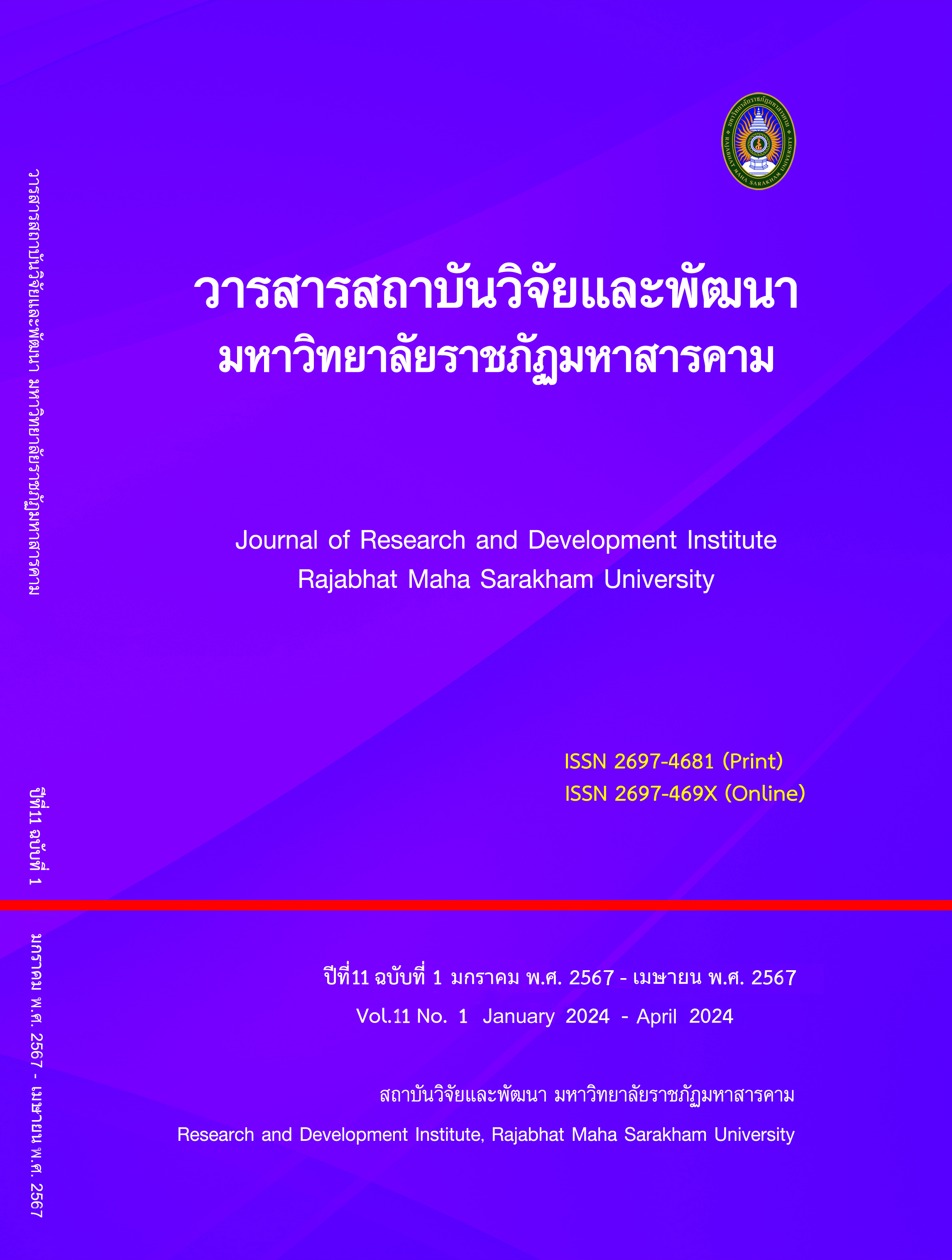Development of lunch recipes from local wisdom to enhance the well-being of Pre-school children for small school, Muang District, Mahasarakham Province
Keywords:
lunch recipes, Local Wisdom, Pre-school childrenAbstract
Objective : 1. To study the nutritional status and food consumption behavior of early childhood children in small schools. 2. To develop lunch recipes from local wisdom to promote well-being of early childhood children for small schools. 3. To propose guidelines for promoting early childhood health for small schools in Muang District, Maha Sarakham Province.
Method : Use a mix method of quantitative and qualitative models. The sample consisted of 109 preschool children. The research tools were a 24-hour retrospective food consumption behavior assessment form, a lunch menu survey. Recipe Acceptance Assessment Form Data recording form from the program ThaiNutriSurvey 2.00 and data collection methods, including surveys, interviews, workshops. The statistics used in the research were frequency, percentage, mean and standard deviation. and presented the data in a descriptive way.
Result : 1. Nutrition status: 4.59% of 5 people underweight, 5.50% of short stature, 6 people, 9.17% of obese 10 people, and 6.42% of becoming obese in 7 people. and consumption behavior, it was found that all children ate breakfast with at least 2 food groups: rice, flour and meat or rice, flour and milk every day and ate 3 main meals a day every day by eating the rice group. - Flour 3 ladles per day, every day, eat eggs 3-7 days a week, 1 egg per day and add salty seasonings such as fish sauce, soy sauce, Maggie in cooked food every time. 2. Energy and Nutrient Assessment It was found that most food recipes passed the quality criteria and the development of lunch recipes from local wisdom. It was found that recipes that need to be improved to increase energy and fat will use more fried oil or ground pork. and reduce the use of fish balls 3. Guidelines for promoting well-being of early childhood children found that there should be agencies at the area to work together with parents integrated both at home and at school systematically from policy formulation. data forwarding system Providing knowledge and organizing developmental activities arrangement of study and play hours Provision of suitable and sufficient lunch
Conclusion : To promote early childhood well-being in addition to providing nutritious quality lunches It also requires cooperation from all sectors in organizing child care activities both at home and at school.
References
Department of Health, Ministry of Public Health. (2017). Guidelines for driving the miracle of the first 1,000 days of life. 1st printing. Bangkok : Agricultural Cooperative Association of Thailand Printing Company Limited.
Duangkhae, K. (2020). Development of guidelines for caring for the growth of early childhood children in child development centers under Local government organization, Phrao District, Chiang Mai Province. Chiang Mai: Chiang Mai University.
Foundation for International Health Policy Development. (2014). Complete report. Project to survey food and nutrition management in child development centers. M.P.T.
Jitchaeng, U. (2018). Lunch standards and their application. Bangkok : Mahidol University.
Thitilertdecha, B. (2017). Development of healthy food for early childhood children. Child care center case study Health Center 5, Ratchaburi. Ratchaburi : M.P.T.
Ungaporn, N. (2013). Prevalence and factors related to nutritional status of preschool children.In the area of subdistricts surrounding Suranaree University of Technology. Thai Journal of Pediatrics.52(1): 70-82.
Wiriyacharee, P. (2018). Sensory Evaluation. (2nded). Chiang Mai : Mahavatiyalaya Chiang Mai.
Downloads
Published
How to Cite
Issue
Section
License
Copyright (c) 2024 ชมนาถ แปลงมาลย์, นุชนาถ มีนาสันติรักษ์

This work is licensed under a Creative Commons Attribution-NonCommercial-NoDerivatives 4.0 International License.
Articles that are published are copyrighted by the authors of the articles







